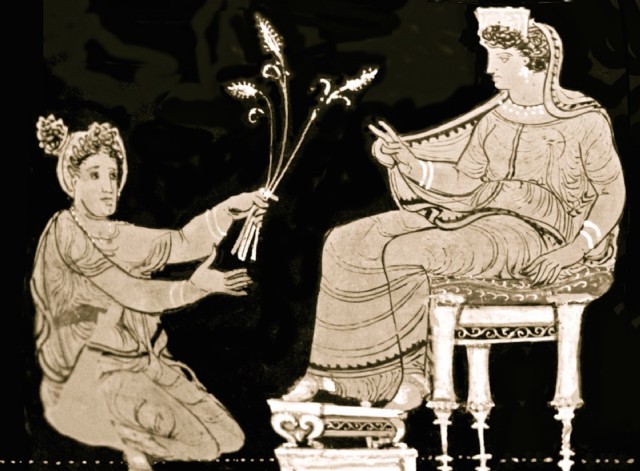Pentelic Fragment Poem by Jared Carter
Pentelic Fragment
When from her hiding-place Metaneira watches
the nurse gathering up her infant son, breathing
softly on his limbs, the scent of that caress
reaches out to her like a wind already passed
over fields of poppies, vast meadows heavy
with narcissus, or tangled thick with myrtle.
Enveloped by that half-sleep, that drowsiness
that slowly draws her toward the realm of mists,
she looks on unafraid.
Seeing Demophoön
bathed in firelight, she can remember only how
the child has grown more fierce and powerful since
the nurse's coming, how he seems to eat nothing,
yet each day waxes stronger, like a young god,
bronzed and confident, preferring the company
of the nurse—a gray stranger who seldom speaks
but who brightens the hearth with her presence.
Of all that happens next, like gestures in a dream,
the mother sees but cannot comprehend—the ways
in which the gods bestow immortal life are veiled
to humans, darker even than their own imaginings.
The stranger, slipping from her old woman's guise
as from a worn mantle, begins to flicker and change
the way a bright fire, casting shadows on the wall,
first one and then another shape reveals, yet
all the while is made of simple light and shade.
Taking the child from her bosom, lifting him up,
she turns him slowly, as a spider wraps its prey
in endless glossy filament drawn from its side,
and with ambrosia—not honeyed drink, but nectar
of being, essence of time, thread which the Fates
alone know how to measure—winds about him now
a seamless web.
Next, like the mother serpent
from whose mouth her frightened children peer about
after the danger's past, the nurse kisses the boy,
tasting his beauty with her velvet tongue, soothing
his cries. Now like a bear she licks him into shape,
now like a moth emerging from its chrysalis into
undreamt-of realms of light, she spreads her wings
over the room, and in that hush becomes, at last,
the goddess Demeter, radiant in her saffron robes,
holding the child before her like a burning torch.
So incandescent now, so quickened by this breath
of immortality, Demophoön sends out streaks
of fire—as when a blade, kindled to brilliance
in a glowing forge, gives off a shower of stars
each time the hammer falls. Plunged into shadow,
heated again from red to bluish-white, he turns
intensely pale—the lambent moon, about to enter
the sun's outstretched arms, casting the broad earth
and all its creatures into sudden night, darkening
even Demeter's brightness where she holds him up.
Across the room slow, lengthening bands of light
slide back into themselves like streams of honey.
Through this bronze gleam, changing to purple now,
this duskiness of fowls roosting, cattle stilled
at mid-day, the goddess strides toward the hearth,
to place him there among low-burning cedar logs—
for in this way each night she cools him in the coals,
letting him sleep till morning, when he will waken
strangely annealed and strong.
Time itself dwindles
at this moment, and death, and all that is mortal,
and as the goddess brings him toward his fiery bed
his mother sees, but cannot speak or shake away
the dream—whether he is a torch wreathed in smoke,
or a snake writhing in those lifted hands, whether
a bunch of blood-red poppies, or a sheaf of grain,
whether the sacrifice, or that which thereby gives
the sign. Nor can she know that by this secret seining
he becomes all signs, passes through each toward
that which has no name. His temporality
fades away, star-like, almost beyond her vision,
even her love. Peacefully resting on the coals,
he closes his dark eyes and settles in the flames.
Later, Metaneira will think she surely screamed,
then rushed from her hiding-place, the spell broken
at last, the goddess angered by her calling—but
whether a voice spoke to her, as from a great height—
whether her son was lifted from the fire, and left
unharmed, to babble softly on the hearth—whether
her daughters, hearing her cries and running to the hall
found nothing amiss, save that the nurse had vanished—
later she will remember, and think it true enough
that such things happened.
Now, she sits by the fire,
pondering those words—'O thoughtless and unknowing
mortals: ye know not whether good or evil approaches.'
Unable to see through that veil, that shadow between
divine and earthly destinies, fortunate indeed
are those who even sense its presence.
At daybreak
Metaneira goes, with her husband and children,
to walk in that place called the well of beautiful dances.
First published in Classical Outlook.

This poem has not been translated into any other language yet.
I would like to translate this poem